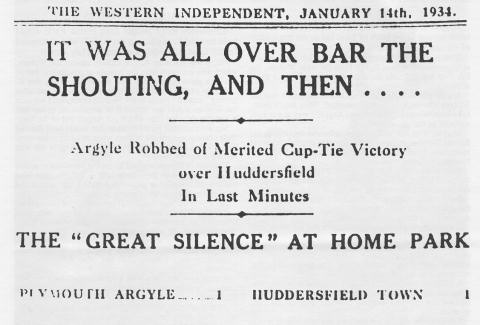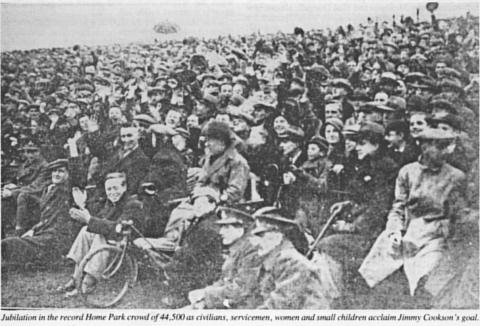 All
roads in the West of England led to Plymouth. Cars, char-a-bancs, buses
streamed in a continuous procession for hours. The railway trains were
crowded. People came in great numbers all the morning. Tickets were booked as
far away as Bristol.
All
roads in the West of England led to Plymouth. Cars, char-a-bancs, buses
streamed in a continuous procession for hours. The railway trains were
crowded. People came in great numbers all the morning. Tickets were booked as
far away as Bristol.
The Cornish trains especially were packed. But a great proportion of the
population of Cornwall seems to have set out early in the morning by road. At
ten o'clock there was a queue of cars and other vehicles at Torpoint
stretching from the ferry back into Fore Street, which increased from that
time onwards. The ferry service was speeded up. The huge boats ran across and
back, regardless of the time-table, as fast as they could take on and disgorge
their load till after one o'clock.
There were signs of an intensified bustle in the City, but the fact that the
traffic did not appear to be much greater than usual was accounted for by the
determination of spectators to be early on the ground.
The first queue outside the turnstiles was formed at half-past seven in the
morning, By nine o'clock this had grown to a small crowd. By half-past eleven
Home Park was besieged, and the authorities determined to open the gates 20
minutes before the time announced.
So that, as the hour for the beginning of the match drew on, the ground, which
seemed to be quite full, was receiving only a trickle of the 44,500 people who
eventually saw the match.
There were then 1,800 cars in the car park. At the finish it took an hour and
a half to get them away.
Among the people in the Grand-Stand were many distinguished visitors. They
included Lord Mildmay of Flete, the Lord-Lieutenant of Devon, the Earl and
Countess of Mount Edgcumbe, Mr. Isaac Foot, M.P., the Mayor and Mayoress of
Plymouth, and many other personages well-known in the West.
No such crowd has ever been assembled at Plymouth before to see a football
match. The total was eight thousand more than the ground had previously held,
and the gate-money, amounting to £3,205, was easily a record.
Ninety-eight people made the all-night journey from Huddersfield. but not all
of them went to the match. A few ladies with the party were so impressed by
Plymouth when they arrived that they decided to spend the afternoon in the
shopping streets and on the Hoe!
Although there were 44,500 spectators the ground was not quite full. The
previous record attendance was 36,631 at a match two years ago, but since then
the banks have been raised and terraced, and possibly, with judicious packing,
accommodation could now be found for 50,000.
An example of the enthusiasm for the match can he gauged from the fact that a
record number of Dockyard employees left work at eleven o'clock and thus
willingly forfeited an hour's pay in order to be in their places early.
Even amongst such a huge crowd there was not much boisterous enthusiasm before
the game, though a riotous welcome was given by those in the stand to one
perfectly gorgeous figure — the vicar of a parish some miles from Plymouth,
who wore a cricket sweater beneath his clerical coat, and a black "topper"
generously bedecked with green, the outfit being made complete with a couple
of rattles!
 There
were the usual witticisms from the crowd. Before the start one particularly
tall policeman was told by a wag that unless he sat down when the game started
he would be on "nights” when the next round tie was played.
There
were the usual witticisms from the crowd. Before the start one particularly
tall policeman was told by a wag that unless he sat down when the game started
he would be on "nights” when the next round tie was played.
Half an hour before the start the Huddersfield players, many wearing bowler
hats, inspected the pitch, and one spectator wanted to know whether they were
footballers or commercial travellers. Later, after some very high kicking by
the backs, one man wanted to know if there was "any snow on the ball yet!” And
during the second half, after the result of the "Penny-on-the-ball”
competition had been announced, the winner, a Brixham man, after a lusty
clearance by Roberts, the Argyle captain, loudly reminded him that he wanted
it for his front-room mantelpiece!
It is probably safe to assume that there were people present from every town
and village in Devon and Cornwall. One of them was an old gentleman aged 89,
Mr. S, Warwick, who had made the journey from Truro. He was accommodated with
a seat in the Press box.
There was a great cheer just before the start when a green and black balloon,
about five feet high, with a horseshoe attached, went up from the ground. On
it were the words “Come on, Argyle. Going up to the First Division? Cheerio
everybody." It would be interesting to know how far it travelled. It headed in
a north-easterly direction. "Twill be just about getting to Huddersfield in
time for the replay on Wednesday,” said a Yorkshireman.
Tribute should be paid to the excellent arrangements for accommodating the
crowd. Perfect organisation had ensured that there was not the slightest hitch
among reserved seat holders, and about one hundred voluntary stewards, drawn
from the Argyle Supporters’ Club and the Devon County Football Association,
assisted with the expeditious packing of the crowd on the terraces.
But the arrangements in the car park were far from satisfactory. The park
itself was full, and there was an “overflow” on closely-adjacent land. But
only one exit was used after the game, with the result that cars were still
leaving an hour and a half after the game was over. With a little foresight
this irritation could have been overcome, by using two or even three exits.
There were thrills galore for the huge crowd between 2.30 and 4.10 p.m., with
two highlights — the thunderous booming cheering that must have been heard
miles away when Cookson scored for Argyle after 20 minutes' play, and that
dramatic equalising goal for Huddersfield when the game had only 90 seconds
left to run. That was the staggering anti-climax, which reduced the crowd to
stony silence, and a few moments afterwards they were wending their way slowly
homewards in a funereal atmosphere.
At the end of twenty minutes came the blow that shattered all the vaunted
superiority of Huddersfield, and set Argyle on the path that looked like
ending in a gallant victory.
During some frantic work in defence Huddersfield had conceded a corner, and
the free kick sent in by Roberts was returned to the feet of Mackay. Instead
of sending it back direct, Mackay easily tricked Young, took the ball a trifle
forward, and then delivered a correct pass to the forwards. Cookson was on it
in a flash, and with a first-time shot drove the ball into the net.
Then came the score just two minutes before the end, which allowed
Huddersfield to fight another day. It was all very surprising. Watches were
out, and shouts were being held to mark the wonderful victory.
The ball was away on the right of the Argyle goal when Bott received it, cut
in, and then sent the ball across the Argyle goal. The other forwards rushed
in, and McLean managed to get to the ball only a yard or two from the
goal-line, and he sent it past Harper.
It was all most disheartening, but the fact remained that Huddersfield had
effected a draw when it appeared a thousand to one that they would be
defeated.
Huddersfield - Turner; Goodall, Roughton, Carr, Young, Campbell, W. Smith,
McLean, J. Smith, Lake, Bott.
Argyle -
Harper; Roberts, Rae, Mackay, McKenzie, Gorman, Grozier, Melaniphy, Cookson,
Briggs, Black.
Scorers: Argyle - Cookson; Huddersfield – McLean. Referee: Mr. S. F. Rons
(Watford).
Attendance: 44,500 (Receipts £3,205).
• Argyle
lost the replay 6-2.
 All
roads in the West of England led to Plymouth. Cars, char-a-bancs, buses
streamed in a continuous procession for hours. The railway trains were
crowded. People came in great numbers all the morning. Tickets were booked as
far away as Bristol.
All
roads in the West of England led to Plymouth. Cars, char-a-bancs, buses
streamed in a continuous procession for hours. The railway trains were
crowded. People came in great numbers all the morning. Tickets were booked as
far away as Bristol. There
were the usual witticisms from the crowd. Before the start one particularly
tall policeman was told by a wag that unless he sat down when the game started
he would be on "nights” when the next round tie was played.
There
were the usual witticisms from the crowd. Before the start one particularly
tall policeman was told by a wag that unless he sat down when the game started
he would be on "nights” when the next round tie was played.